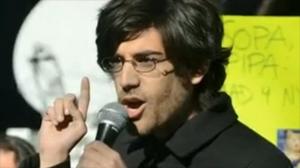Aaron Swartz: What We Know So Far, What We Need to Know
 The reaction to Aaron Swartz's suicide has quickly reached a level of intensity which may have surprised those who will eventually need to respond to it.
The reaction to Aaron Swartz's suicide has quickly reached a level of intensity which may have surprised those who will eventually need to respond to it.
Much of this anger is directed at Assistant Prosecutor Stephen Heymann who, according to reports, pushed for Swartz's prosecution, refusing to negotiate any reduction in sentence without Swartz pleading guilty to all thirteen charges. Next in line is Heymann's boss, States' Attorney Carmen Ortiz, who may have recognized in Swartz's prosecution an opportunity to advance herself by claiming a highly coveted scalp: Swartz successfully organized the public against the passage of SOPA legislation (the "Stop Online Piracy Act"), to the great displeasure of the Washington establishment.
At first, Ortiz's strategy seemed to be working—she was mentioned by Obama friend, Massachusetts Governor Deval Patrick, as his possible successor. But by now, it has surely backfired.
Petitions targeting Heymann and Ortiz are on file with the White House and are attracting thousands of signatures.
Their receiving even a mild sanction, would, of course, constitute a major victory for Swartz's supporters. But, in the unlikely event this occurs, it needs to be understood that they will be taking the fall for higher-ups who bear more responsibility.
Included within this latter group is one figure whose name has been conspicuously absent from much of the discussion of the case: former MIT President Susan Hockfield. It was Hockfield who, it appears, signed off on moving forward with the prosecution when JSTOR, the digital database that was the primary victim of Swartz's alleged theft, was more than willing to drop charges. Furthermore, according to press reports, "MIT administrators" scuttled a plea bargain arranged with the prosecutor, JSTOR, and Swartz's attorney under which Swartz would serve no jail time.
In pursuing a harsh punishment for Swartz, Hockfield placed herself in the vanguard of a new generation of college administrators who have actively sought confrontations with activist elements on their campuses.
Others in this group are University of California chancellors Robert J. Birgeneau and Linda Katehi, whose militarized response to non-violent protest on the Berkeley and Davis campuses resulted in breaking the ribs of former U.C. Poet Laureate Robert Haas and a million dollar settlement against the university for pepper spraying of Occupy Wall Street demonstrators.
Remarkably, each of these figures has ties to Hockfield: Birgeneau is a former MIT Professor of Physics and Dean of Science who has served with Hockfield on numerous panels and boards. Katehi serves with Hockfield on the National Security Higher Education Advisory Board, founded by the FBI for the purpose of "discussing . . . the promotion of strategic national security partnerships with academia."
It appears that these "discussions" have reached the same conclusion reached by Ortiz: the promotion of national security requires "getting tough," meaning the routine violent crackdown on campus protest and the aggressive prosecution of those who would previously have been dealt with internally with a slap on the wrist, at most.
Finally, the ultimate responsibility resides with the Obama Justice Department and Obama himself, whose successful marketing as a liberal and civil libertarian has enabled the movement of the conventional wisdom on such matters as indefinite detention, extra judicial execution, habeas corpus, and torture to a rightward point on the spectrum, which even extreme conservatives could not have dreamed of only a few years ago.
University presidents cannot be expected to challenge elite consensus, least of all MIT presidents, who are, after all, reliant on the federal government for roughly half of their operating budget.
But while Hockfield is not to be judged by the standards set by such great MIT dissidents as Norbert Wiener, Salvatore Luria, and Noam Chomsky, what MIT should expect is an administration willing to act with tolerance and forbearance.
Indeed, MIT administrations going back many years have a long tradition of doing just that.
According to one faculty member, Hockfield—described by him as a union busting import from Yale—is widely seen as having broken with this tradition by instituting "a 'rules is rules' mentality that was cold and bureaucratic towards students and anyone else who got out of line."
In contrast, Hockfield's successor, Rafael Reif, is viewed very favorably, his appointment of Hal Abelson to investigate MIT's role widely hailed by the MIT community and Swartz's supporters.
The best possible result of Abelson's investigation would be the public release of all communications between MIT and the Justice Department. Should these materialize, they will almost certainly show both the MIT and Obama Justice Department in a highly unflattering light. The latter surely deserves to have its shameful record of prosecutorial dishonesty, bullying, and abuse exposed to the light of day.
It is of course a foregone conclusion that they will fight the release of these documents. The faculty and students at MIT and all of us who admired Aaron Swartz should recognize that exposing these is the best and most fitting commemoration of his life and work.
John Halle is Director of Studies in Music Theory and Practice at Bard College.